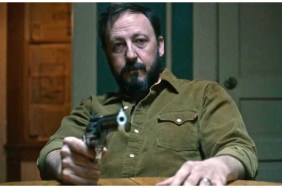On Saturday, April 17, the new season of Doctor Who will begin on BBC America, and the American fans of the long-running science fiction show will get their first gander at the 11th actor to play the Timelord from Gallifrey, Matt Smith.
For those who’ve never seen a single episode and know nothing about the show, The Doctor is an immortal who travels through time and space in his spaceship, the TARDIS, which looks a lot like a British police box on the outside, ending up in all sorts of dire predicaments. The series debuted on BBC in 1963 with William Hartnell in the lead role, and since then the show has been kept alive by a series of actors, allowing it to achieve a Guinness World Record as the longest running science fiction show on television. The coolest thing about the show in recent years is that BBC America has been releasing the new episodes in the States much closer to their UK counterpart, so the growing American fanbase hasn’t had to wait for a year or more to see them, which used to be the case.
The news last year that 27-year-old Matt Smith would be taking over for the popular David Tennant was met with some skepticism due to his youthful looks, but then head writer Steven Moffat decided to shake things up further, promising to bring in a new TARDIS and taking out some of the old standbys like the Doctor’s ever-present Sonic Screwdriver. Smith’s Doctor would also be joined by his newest cute companion, Amy Pond, played by Karen Gillan.
Earlier this week, ComingSoon.net got on the phone with Moffat to talk about some of the changes and how they came about.
ComingSoon.net: I’m very excited about the new season. We’re a week behind the UK as you probably know and I haven’t seen anything yet unfortunately having missed it at WonderCon for various reasons. I know you’ve been a fan of “Doctor Who” and been involved with it so closely over the last couple of years. I understand the decision came out of casting a new “Doctor” but I understand you’re changing a lot more than that, so why was now the time to do a reboot?
Steven Moffat: As David was leaving and you’re going to have a big monumental change, then you think why not just go for it and change everything? We had to have a brand new cast and have a brand new companion at the same time, and it was just more exciting and more challenging to redo the lot. Also, if you know “Doctor Who,” it’s part of the DNA of the show that he does that. They just periodically throw everything out and just start again. That’s one of the reasons he sort of never gets old, because he never is old. He’s always quite recent. It almost is an opportunity for new members of the audience to come on board, because they think, “Well, this is a version I’ll watch. This will be my Doctor.” Chapter One is always the most exciting chapter of a book in a way, isn’t it? Because it’s the beginning and suddenly, you can go back and do it all again and I’d say that’s what keeps this very, very old show very, very young.
CS: With David Tennant and the last few specials with him taking on the Master, you really hit a high watermark for the series in many ways, so is it hard starting again and do you have to start at a lower point so you can build up to something that big again?
Moffat: You haven’t seen our first one yet. No, I think we manage fine with that. You know, the great thing with “Doctor Who” is it’s always the end of the world. That’s just another day at the office. I don’t think you’ll find it any more lacking in size or scale. I’m very very happy with what they’re saying and that’s fine, but the truth is, the big dilemma in the adventures the Doctor faces are just the means by which we know him. He’s the exciting element rather than the big crisis. It’s not so much what’s ending the world and how the Doctor is gonna stop it. In our first episode, we have a Doctor freshly-regenerated with no time to recover and his TARDIS is wrecked, and he’s just written off his screwdriver, and he’s got 20 minutes to save the entire planet and he’s stuck in a tiny, little village, and it’s a real terrible first night for him.
CS: With that in mind, is it hard to maintain that kind of pace for an entire season or are you setting it up so you have some high points and some places where he can mellow out a little bit? What’s the season gonna be like in general?
Moffat: Well, I mean, I think the arc of the Doctor is to hit as many high notes as you can really. It has to be something quite high-octane and the first six episodes, it’s going like a train, and then Episode 7 is our first chance to catch breath, and then in the ninth episode, we have something a little bit gentler, I kind of think that if you want as many high points as possible, why not? It’s that kind of a show. I mean, I always think every scene in “Doctor Who”–and this always been the case since the very early days of the show– every “Doctor Who” kinda ended on an ominous cliff hanger. For eight-year-old watching that, they’re not gonna put up with just people chatting.

CS: Right, so Matt’s the 11th Doctor now. When people first saw his picture, many thought “Oh, he’s really young,” but in fact, he’s 27, which isn’t that young. What was it about him that made him the right person to replace David who had become so popular, especially here in the States?
Moffat: Well, this is a question that nobody really asks once they see him, and you won’t either. Once you see him in action, you’ll see what makes him the right guy. The age thing is irrelevant. In fact, as we were entering the casting process, I was more inclined to go a little bit older, like maybe mid-40’s, for the Doctor. On the very first day, Matt came in, third person through the door, and he just got it. He just got it in spades. He just understood how he could play that part. It’s hard to define what that is, maybe even slightly destructive to define what that is, but he just had the playfulness and the fun of the naughtiness. He’s handsome, but he’s handsome in a rather strange way. He’s got cartoon hair and the mannerisms of a fussy old, nutty professor, but the body of a hot young fella. You know, how can that not be cast as the Doctor? And nobody else came close (Laughs) in just embodying the part. I swear, he’s been a huge hit in Britain already. When you see him you’ll think, “Oh, he is, of course. Well, yes.” Casting Matt is honestly the biggest no-brainer of this whole process.
CS: Back in the day when William Hartnell was Doctor Who, I’m guessing the idea to have the Doctor regenerate was partially them needing a new actor to continue the show. At this point, how much of changing the Doctor is done creatively and how much is done just because an actor’s contract has run out or he wants to move on? And how does it work creatively when you need to get a new Doctor?
Moffat: Well, I mean, it’s just a challenge every single time you do it. It’s not something you think, “Oh my god, we’ve gotta get a new star for this incredibly big show.” Every single time I’m sureI’ve only been included once–but every single time production teams have faced that challenge, it’s probably seemed impossible. I mean, it is impossible until the second it becomes incredibly easy, because you see someone sitting across the room from you that’s the right guy. It must have seemed impossible to replace Jon Pertwee and then in walked Tom Baker. That’s what happens. It’s impossible anyone could ever play James Bond except Sean Connery, isn’t it? Except all the other James Bonds were also great. You just have that and there’s always gonna be someone. You just have to find them.
CS: Is the biggest challenge as a writer to find them or to find a way to write for them that makes them a little different from the last one? Or does that stuff just work itself out?
Moffat: To be honest, I’m really using what is really quite essential and important (and that’s that) he’s the same man. There aren’t eleven Doctors, there’s one Doctor with eleven faces. So in a way, the purest way of writing the new doctor is simply to write the doctor as obviously and clearly as you can, and let the new actor embody that part different. Then as you start to get to know that new performance, then you start to tailor it to that actor, but you do that sort of unconsciously. You don’t make conscious decisions. You just say like, “Well, he looks funny when he does that, or he sounds funny when he does this,” and you go in those directions. The part on the paper doesn’t look that different on the page. I was looking at some of the old Tom Baker scripts the other day. You know, we could give those scripts to Matt, and it would be fine. I would just come out very different, because Matt’s a very different actor than Tom Baker, but it’d be fine. The Doctor Who’s the Doctor, that’s the most important thing.
CS: How hard is it for Matt to kind of create his own identity, because obviously when you have ten actors before you, you kind of want to continue that flow of the character, but also give it your own thing?
Moffat: Well, I think you should ask Matt that question, but I mean, you get the script and you play the ass off of it is the answer. He does it his own way. There’s never any question of impersonating anyone or trying to be the same as the others. We also told him make it quite eccentric. I remember I said to him, “If you’re gonna do this part, make it your own star vehicle. Make it you. Don’t turn yourself into the Doctor, turn the Doctor into you.” When an actor grabs a part and really makes it their own, what they do is they make it a vehicle for themselves. That’s what Matt’s done, he’s turned the Doctor into him.
CS: Now you’ve written so many episodes yourself, do you have a preference as far as modern London, period London, or outer space otherworld? I mean, obviously you’ve done all of them at this point. What’s your personal preference?
Moffat: (Laughs) Well, we are slightly limited by the fact that we shoot on planet earth, and we don’t have the biggest budget in the world. (laughs) So we do tend to do a lot on earth for our stories, and that’s inevitable and proper. If you look at the history of “Doctor Who,” generally speaking he’s quite humancentric. Even if you’re on another planet, he tends to involve human beings. If it’s nothing but lizard people than I think you start to lose track of the plot a bit. My personal preference is, if I only had one, and that’s to tell great stories. It doesn’t matter who plays the role, it’s just gotta be a great story.

CS: As far as the budget, when you write something how limited are you when your ideas when you know you only have a certain amount you can use? Do you try to do a certain amount of shows on earth to save up budget to do something bigger on another planet later on? How does that work exactly?
Moffat: Yeah, we do. If we have a really strong idea for an episode, the point is if you’re doing a lower-budget episode. I mean “Blink, which was a very successful episode was not a big budget at all. If you have a strong idea for an episode that isn’t gonna break the bank, then you think, “Well, all right, that’s gonna help us do the finale this year where we’ll need a little bit more bang and flash.” So yeah, you do that. I mean every show does that. That’s not unique or special, that’s just the normal economics of television.
CS: I wanted to ask about Neil Gaiman because that’s just awesome to hear he’s going to write a couple episodes. What was involved with getting him aboard? How much leeway is he gonna have to bring his own sensibilities to his episodes?
Moffat: Well, he really clearly wanted to write one, so we met up. There wasn’t any great protracted negotiation, he was quite up for it. We had just Emailed on various subjects before, so we just met up. That was before I had taken over during that period where everybody knew I was taking over but I wasn’t allowed to say I was while that went on. And how much leeway will he have? I mean, to be honest, Neil’s sensibility is pretty damn “Doctor Who,” that’s the truth. I think he’d admit that himself. I mean, I could tell. I knew just knowing Neil’s work that he was a “Doctor Who” fan, because he’s full of “Doctor Who.” I think he was a very, very easy fit into this world. Really and truly we’re not trying to limit people’s sensibility, any of the (writers). I mean, Richard Curtis is a very different sort of writer. We’re not trying to make him write “Doctor Who” the way Terry Nation would or the way I do; we’re trying to bring the different voices into the mix and make it more interesting.
CS: Is Richard Curtis’ episode this season?
Moffat: Yes, Richard has written Episode 10.
CS: Ah, we’ll have to wait a little while for that. Okay, cool. Quick question before we leave, I know we’ve seen a lot of the Daleks and Cybermen and the Master. I know you’re trying to do something different with this season, but how hard it is to fight the urge to either bring back the old stand-bys or go to other seasons to bring back villains Tom Baker has fought, etc? How hard is it to balance doing new things versus retaining some of the old?
Moffat: I don’t really have much of a notion to do any of that. Seriously, I mean, if I had to think of a new idea that would involve bringing back an old monster I would do it. I mean, only if it’s a good idea for a story. I don’t have any baseline urge. I keep saying that the easiest thing in the world is writing “Doctor Who” without their bringing back a single (character) back from history, it’s really quite simple. It’s not a big deal. It’s only if you’ve got a good idea.
You can see the Series Premiere of Matt Smith as Doctor Who is on Saturday, April 17 at 9 p.m. Eastern on BBC America, preceded at 8 p.m. by “Doctor Who: The Ultimate Guide.”









